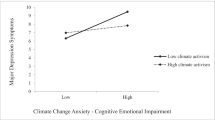Abstract
Here, Ann Cvetkovich, interviewed by Abby Wilkerson, brings Cvetkovich’s influential cultural studies analysis of depression explicitly into conversation with disability studies. Cvetkovich understands “feeling bad” (a term she prefers to “depression”) as a defining affective state under neoliberalism. Drawing on a distinctive historical/cultural archive, she challenges the atomism of the neoliberal medical model that frames depression and affective distress more generally as the result of faulty brain chemistry—individual organisms gone awry. Instead, she traces these common experiences to sociopolitical phenomena ranging from current neoliberal demands for productivity as exemplified in university life, to histories of colonization, slavery, and displacement. The conversation considers the value of disability frameworks for understanding mental health diagnoses and the intersections of social institutions, bodily practices, and everyday affective life.


Similar content being viewed by others
References
Chen, M. 2012. Animacies: Biopolitics, racial mattering, and queer affect. Durham: Duke University Press.
Cvetkovich, A. 2012. Depression: a public feeling. Durham, NC: Duke University Press.
———. 1992. Mixed feelings: Feminism, mass culture, and Victorian sensationalism. New Brunswick, NJ: Rutgers University Press.
Forney, Ellen. 2012. Marbles: Mania, Depression, Michelangelo, and Me. New York: Gotham.
———. 2016. “Biopolar 1 as graphic memoir.” Journal of Bioethical Inquiry 13(4): 1176–7529.
Freeman, L. 2014. “Undone: Meditations on grief and longing.” Paper presented at Composing Disability: Diagnosis, Interrupted, April 3–4, George Washington University, Washington, DC.
Halberstam, J. 2011. The queer art of failure. Durham: Duke University Press.
Kafer, A. 2013. Feminist, queer, crip. Bloomington: Indiana University Press.
Lewis, B. 2014. “Narrative identity, pharmaceutical marketing, and mental health liberation.” Paper presented at Composing Disability: Diagnosis, Interrupted, April 3–4, George Washington University, Washington, DC.
Love, H. 2007. Feeling backward: Loss and the politics of queer history. Cambridge: Harvard University Press.
Minich, J A. 2013. Accessible citizenships: Disability, nation, and the cultural politics of Greater Mexico. Philadelphia: Temple University Press.
Nakamura, K. 2014. “Barrier-free brothels and call-girls for crips: Debates about access to sex and sexual release services for men with disabilities in Japan.” Paper presented at Composing Disability: Diagnosis, Interrupted, April 3–4, George Washington University, Washington, DC.
Price, M. 2014. “The problem of bodymind and the possibilities of pain.” Corbett Lecture, Department of English, Columbus: The Ohio State University.
Stevens, B. 2014. “Orgasmic freedom: Cripping sex and speaking shame.” Paper presented at Composing Disability: Diagnosis, Interrupted, April 3–4, George Washington University, Washington, DC.
Widner, C. 2013. “Malaise and methodology: Ann Cvetkovich crafts a radical approach to considering depression” The Austin Chronicle. January 18.
Acknowledgments
We thank Shyama Rajendran for her care and diligence in producing a transcript of our conversation, as well as Jonathan Hsy and George Washington University’s Digital Humanities Institute, who provided generous support for this process.
Author information
Authors and Affiliations
Corresponding author
Rights and permissions
About this article
Cite this article
Cvetkovich, A., Wilkerson, A. Disability and Depression . Bioethical Inquiry 13, 497–503 (2016). https://doi.org/10.1007/s11673-016-9751-z
Published:
Issue Date:
DOI: https://doi.org/10.1007/s11673-016-9751-z




